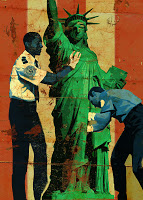 |
| Anthony Freda |
SARTRE, Contributing Writer
Activist Post
The underpinnings that fallaciously attempt to justify despotic regimes rely upon the perverted practice of controlling the public mindset in weak societies.
The indisputable evidence that civilization is regressing at lightening speed is all around us. Governments are becoming irrelevant with the passage of illegitimate authority consolidating into the hands of oligarchic cabals and global tyrants. An objective study of the voluntary abandonment of individual sovereignty is worthy of an entire scholarly discipline.
However, before confused citizens seek psychoanalysis on a couch of technocrat design, the basic principles of a classical education should be applied.
Philosophical inquiry is meant to seek an understanding of the truth. Truth, when known, vindicates the dignity of the person and the value intrinsic within the human race. Therefore, it comes as a great letdown to face up to the horrendous savageness that society accepts as typical behavior. The psychological techniques used to train people to accept tyranny as the normal course of conduct is practiced by every despotic regime.
Jon Roland in an essay, Principles of Tyranny provides a valuable insight:
Perhaps one of the things that most distinguishes those with a fascist mentality from most other persons is how they react in situations that engender feelings of insecurity and inadequacy.
The emergence of tyranny, therefore, begins with challenges to a group, develops into general feelings of insecurity and inadequacy, and falls into a pattern in which some individuals assume the role of “father” to the others, who willingly submit to becoming dependent “children” of such persons if only they are reassured that a more favorable outcome will be realized. This pattern of co-dependency is pathological, and generally results in decision-making of poor quality that makes the situation even worse; but, because the pattern is pathological, instead of abandoning it, the co-dependents repeat their inappropriate behavior to produce a vicious spiral that, if not interrupted, can lead to total breakdown of the group and the worst of the available outcomes.
In psychiatry, this syndrome is often discussed as an “authoritarian personality disorder”. In common parlance, as being a “control freak”.
Mr. Roland identifies the following traits associated with a tyrannical regime:
| Control of public information and opinion | Use of the law for competition suppression |
| Vote fraud used to prevent the election of reformers | Creation of a class of officials who are above the law |
| Undue official influence on trials and juries | Subversion of internal checks and balances |
| Usurpation of undelegated powers | Conversion of rights into privileges |
| Seeking a government monopoly on the capability and use of armed force | Increasing public ignorance of their civic duties and reluctance to perform them |
| Militarization of law enforcement | Political correctness |
| Infiltration and subversion of citizen groups that could be forces for reform | Increasing dependency of the people on government |
| Suppression of investigators and whistleblowers | Use of staged events to produce popular support |
The consequences that follow disturb psychological attributes often reflected in an Hobbism view of government. Thomas Hobbes, believed that ‘order’ and effective law enforcement were the primary conditions for human survival (‘In the state of nature … no society’). Hobbes viewed human beings as essentially selfish and thought that democracy could easily degenerate into chaos, poor government and eventually civil war. The kind of governments that would have been approved by Hobbes would include benevolent dictators and enlightened despots and monarchies.
For those who accept this position as a foundation of a pseudo vindication for authoritarian rule, Enlightened Despotism becomes the norm. The masses learn to accept the vicious obvious as the inevitable surrender to the profane. The propaganda used to indoctrinate the public that acceptance of progressive thought as preferable to classic principles of human dignity has a long history.
Going back to the era where kings and queens, needed an argument to convince the populace that their authority was justified, the reliance upon psychological distortion was common.
Enlightened Absolutism or Enlightened Despotism as it is more often called can be defined as a form of government strongly influenced by the wide propagation of ideas and the political philosophy of the Enlightenment. It is a term first used by the Philosophes in the second half of the 18th century that manifested to describe a particular phase in the development of absolutism. The term ‘Enlightened Despot’ refers to those 18th century monarchs who were familiar with the ideas of the Enlightenment and distinguished themselves from regular despots by the way they governed.
Today, the same attempts to deceive are employed with all the sophistication that modern technology can develop. The best example of the current cult of mind control and historic distortion is found in the Neo-Conservatism that has hijacked the Republican Party.
Norman D. Livergood uses a contemporary NeoCon example to illustrate the anti-intellectual disconnect use to justify despotic rule:
Leo Strauss is the ‘Fascist Godfather of the neoconservatives.’ His neocon disciples believe that an elite should use deception, religious fervor and perpetual war to control the credulous American population. The primary goal of Strauss and his disciples is to turn back the clock of history to before the Enlightenment, when ancient tyrannies ruled without restraint.
A Leo Strauss could only become a professor of philosophy in a demented age in which people in general and scholars in particular could not see through his nonsense. Strauss, for example, claimed to have ‘discovered’ a Plato without a doctrine of ideas or immortality of the soul, a Plato without metaphysics.
Much of the media’s distorted worldview is essentially a philistine portrayal of an absurd account of events. The significance of their misinformation embeds a disinformation culture with even more advanced distortions. Without a sincere commitment to follow the search for truth and act upon valid conclusions, from the evidence uncovered, no country can exist as a free nation.
America has fallen into a deep and extensive delusional state of mind since 9/11. The Tyrannical trait that Mr. Roland lists has expanded and intensified in the last decade. The pathetic justification used and repeated to sell despotism is that the “War on Terror” requires a suspension of constitutional protections. Such obscene rhetoric should be abhorrent to any rational and moral citizen. Yet, the absence of objective inquiry only leads to the inevitability of despotic tyranny.
Forgo the politics of 9/11 if you must, but listen and examine the conclusions of Christopher Rudy and ask yourself why facts no longer matter to so many people:
The reality is that the American people, as individuals, have lost their courage. The government prefers it that way, as a fearful people are easier to rule than a courageous one. But Americans don’t wish to lose their self-image of courage. So, when confronted with a situation demanding courage to challenge a government gone wrong, the American people simply pretend that the situation does not exist. Cherished illusions supersede hard reality.
When the World Trade Towers collapsed, most Americans simply refused to believe suggestions that the attacks had been staged by parties working for the U.S. Government itself. Americans were afraid to even as news reports surfaced proving that the U.S. Government had announced plans for the invasion of Afghanistan early in the year; plans into which the attacks on the World Trade Towers that angered the American people into support of the already-planned war fit entirely too conveniently. But so trapped are Americans by their belief in their own bravery that they will themselves to be blind to the evidence before their eyes so that they can nod in agreement with the government while still imagining themselves to have courage, even as they avoid the one situation which most requires real courage; to stand up to the government’s lies and deceptions.
At play in this… Mr. Rudy’s analysis is an implicit acknowledgement of the regretful mind control used to exert the psychological tyranny that is so easily accepted, when the majority believes in a philosophy of despotism. This illogical philosophy adopts the state worship of the NeoCon War Party. Ignored or rejected is the remarkable basis and essential nature upon which lead to the creation of this country.
Refusal to question, or exhibiting the timidity by sitting on their hands, after knowing the ridiculousness of official accounts of government benevolence, rejects the entire heritage of philosophical inquiry. Hobbes’ view of human nature seems accurate. However, his alternative for the State provides false cover for the despots that thrive on their desire for psychological manipulation of citizens for the benefit of their tyrannical fellow travelers.
The sickness that engulfs society today is a direct result of abandoning the search for truth. Tyranny can be defeated, but it will take courage to break away from the psychopathic distortions and lies. It will take brave souls to confront the normal pattern of despotism. This objective bears the ultimate fruits from living a life of philosophical integrity.
The three aims of the tyrant are, one, the humiliation of his subjects; he knows that a mean-spirited man will not conspire against anybody; two, the creation of mistrust among them; for a tyrant is not to be overthrown until men begin to have confidence in one another – and this is the reason why tyrants are at war with the good; they are under the idea that their power is endangered by them, not only because they will not be ruled despotically, but also because they are too loyal to one another and to other men, and do not inform against one another or against other men – three, the tyrant desires that all his subjects shall be incapable of action, for no one attempts what is impossible and they will not attempt to overthrow a tyranny if they are powerless. — Aristotle
Original article archived here
SARTRE is the pen name of James Hall, a reformed, former political operative. This pundit’s formal instruction in History, Philosophy and Political Science served as training for activism, on the staff of several politicians and in many campaigns. A believer in authentic Public Service, independent business interests were pursued in the private sector. Speculation in markets, and international business investments, allowed for extensive travel and a world view for commerce. SARTRE is the publisher of BREAKING ALL THE RULES. Contact batr@batr.org
linkwithin_text=’Related Articles:’





Be the first to comment on "Psychology of Tyranny for a Philosophy of Despotism"